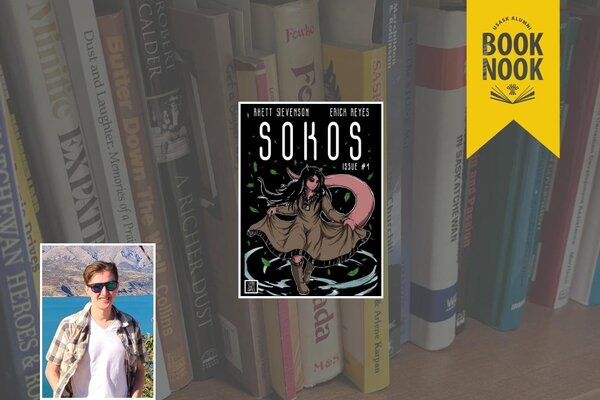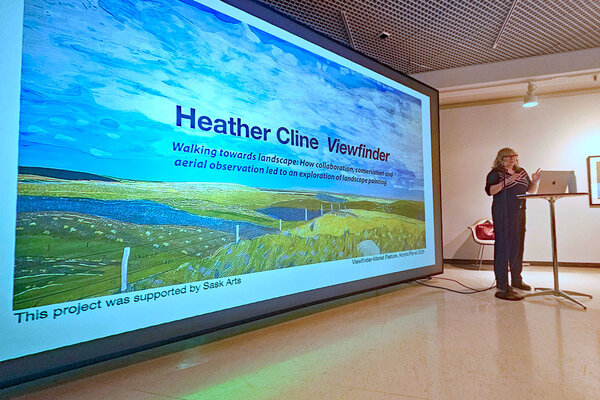
USask awarded $482,150 to develop digital service for provincial arts organizations
Investment made through the Canada Council for the Arts' $88.5-million Digital Strategy Fund
By Shannon Boklaschuk
The University of Saskatchewan (USask) Art Galleries and Art Collection has been awarded more than $480,000 to develop a digital service that will help arts organizations in the province better engage with their audiences.
The Canada Council for the Arts provided $482,150 for the three-year project. The investment was made through the Canada Council’s $88.5-million Digital Strategy Fund, which supports Canadian artists, groups and arts organization in understanding the digital world, engaging with it and responding to the cultural and social changes it produces.
“We are increasingly living in a digital world. Technologies such as augmented reality, apps and social media are being utilized more frequently by arts organizations in Saskatchewan and beyond,” said Jeremy Morgan, interim managing director of the University of Saskatchewan Art Galleries.
“Through this new project, we are seeking to better understand what our audiences want and need as digital technologies continue to grow and evolve. For example, how do we reach and engage with people whose main connections to the world are through digital means?”
By partnering with digital design experts at USask, the project aims to employ user-centred and service design methods to make new technologies accessible to smaller arts organizations in the province. USask will provide in-kind use of its facilities, including digital labs, and will employ summer students, graduate students and staff members as part of the initiative.
“By promoting conversation around art online and allowing audience members a greater ability to contribute, this project will democratize the process of creating and curating, allowing for the inclusion of Indigenous and other underrepresented voices,” said Dr. Peta Bonham-Smith (PhD), dean of the College of Arts and Science.
Five digital experts from the College of Arts and Science’s departments of archaeology and anthropology, art and art history, and computer science, as well as from the University Library, have committed in-kind support to guide the customization and the development of innovative digital technologies. They will work with a project manager, user engagement assistants, digital design assistants and others who will form the digital design team to be located on the USask campus.
Numerous Saskatchewan arts organizations offered their insights on the project prior to the submission of the grant application. Métis artist and USask alumnus Michael Peterson, who represents Nuit Blanche Saskatoon and Void Gallery, served as the user research lead.
“We really emphasized a design approach with this grant. Rather than proposing some already finished end product, we held participatory design workshops with art goers, artists and arts organization staff to better understand their needs and how they desire their experience of the arts to be improved,” said Peterson.
“The grant was able to speak from this first-person knowledge and proposed a process that involves these end users throughout to ensure their experiences form the basis for the new technologies developed.”
Peterson said new digital technologies, such as augmented reality, offer many opportunities for engaging with art, but most Saskatchewan arts organizations don’t have the capacity to use them. By partnering with the experts at USask, the project will not only develop technologies for the size and scale of the organizations, “but will provide training on how to use them and how to develop content to ensure these organizations are able to incorporate these technologies within their existing operational capacity.”
Other project partners are also excited about the potential of the new digital service. Joel Bernbaum, artistic director of Sum Theatre Saskatoon, said the project will enable his theatre company to “tap into a whole new kind of citizen engagement.”
“Saskatchewan’s artistic community is a delicate ecosystem. The arts, at their core, are about connection,” he said. “This initiative has the potential to serve to strengthen both our connections to audiences and our connections to each other.”
SaskCulture CEO Rose Gilks described the project as “an important opportunity to connect more people from local arts communities scattered throughout the province in meaningful engagement as part of Saskatchewan’s larger artistic community.”
“New digital technologies allow us to break down some of the geographical barriers that exist in this province, increase access and build new relationships, enabling smaller organizations and underserved communities more opportunities to contribute to building a culturally vibrant Saskatchewan,” said Gilks.
“SaskCulture is particularly pleased that this project includes partners offering Indigenous perspectives, such as Wanuskewin and Sâkêwêwak, that will support moving forward in a spirit of reconciliation and collaboration.”
An advisory committee that includes the managing director of the University of Saskatchewan Art Galleries and Art Collection, two representatives from participating Saskatchewan arts organizations, one practicing Saskatchewan artist, two members of the public and three members of the digital design team will oversee the project. It will run until February 2022.

We acknowledge the support of the Canada Council for the Arts.
Nous remercions le Conseil des arts du Canada de son soutien.
About Canada Council for the Arts
The Canada Council for the Arts is Canada’s public arts funder, with a mandate to foster and promote the study and enjoyment of, and the production of works in, the arts. The Council champions and invests in artistic excellence through a broad range of grants, services, prizes and payments to professional Canadian artists and arts organizations. Its work ensures that excellent, vibrant and diverse art and literature engages Canadians, enriches their communities and reaches markets around the world. The Council also raises public awareness and appreciation of the arts through its communications, research and arts promotion activities. It is responsible for the Canadian Commission for UNESCO, which promotes the values and programs of UNESCO in Canada to contribute to a more peaceful, equitable and sustainable future. The Canada Council Art Bank operates art rental programs and helps further public engagement with contemporary arts.


